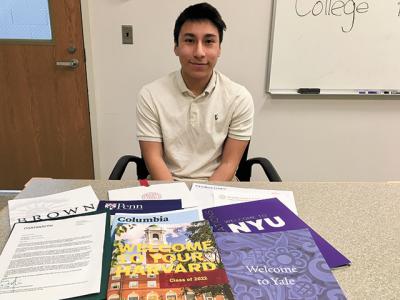Valedictorian Has Pick of the Ivies

For many high school seniors, early spring can be a nail-biter of a season as college notifications trickle in bearing news of acceptances and rejections or the purgatory of being waitlisted.
For one East Hampton High School senior, however, responses from his desired universities came like so: Yale, yes. Brown, yes. Cornell, yes. University of Pennsylvania, yes. Columbia, yes. Dartmouth, yes. Princeton . . . not yet.
“I was really demoralized after being waitlisted by Princeton,” said Alexander Sigua Pintado, known as Nick, who is East Hampton’s valedictorian this year. “I thought there was no way I was getting into Harvard because it has a lower acceptance rate than Princeton.”
He was wrong. Harvard said yes, yes, yes.
Nick got into seven of the eight Ivy League schools, just one shy of the so-called Ivy League Sweep.
Whether it is seven or eight is hardly relevant. We are officially in an era where getting into even one of those hallowed institutions, whose acceptance rates range from 4 to 12 percent, is considered a superhuman feat. Applicants are expected to submit not only near-perfect scores on their SAT or ACT college application tests, but also to show grade point averages that usually exceed the coveted 4.0, made possible by taking staggering numbers of advanced level courses in high school. They also have to craft a standout essay, clock roughly 100 hours of community service, and be either an athlete, accomplished musician, artist, or debate champ. In addition, they are required to somehow demonstrate characteristics such as curiosity, empathy, openness to change, and ability to overcome adversity — factors that college admissions officials call “predictors of success.”
Marilyn Marsilio, Nick’s high school counselor, who has worked in the East Hampton School District for 25 years, said she does not remember ever seeing one student receive seven Ivy League acceptances in one year.
“I burst out crying when I found out about Harvard,” said Nick. “I was so surprised especially considering the acceptance rate this year for regular decisions applicants was 2.43 percent.” He added that the overall rate for both early and regular applications was 4.59 percent. In selecting its freshman class of about 2,000, Harvard rejected approximately 35,000 applicants this year.
He texted his good news to a friend and when he walked into his classroom the next morning, everyone started clapping. “It felt really good to have this community backing me,” he said.
Harvard even offered the 17-year-old “the best financial package of all the schools, which will really help lessen the financial burden on my family,” he said. Nick’s mother works in the cafeteria of the Ross School in East Hampton and his father is a carpenter and landscaper. Both are from Ecuador and moved to Springs 20 years ago. Neither went to college.
What narrows the acceptance odds even further at these world-famous institutions is that they admit legacy candidates, that is children of alumni and those of big donors, at a much greater rate than nonlegacy students. Legacies make up nearly a third of Harvard’s current freshman class, The Harvard Crimson reported, while Princeton’s class of 2021 is 13 percent legacy, according to the university’s website.
In addition to the eight Ivies, Nick also applied to Georgetown University, New York University, Northeastern, and to the State University at Binghamton. They all accepted him.
“I can see myself fitting in each of these schools,” he said, but admitted that he is leaning toward Harvard. “It’s been my childhood dream to go there.”
He has until May 1 to decide and the factors he will consider are the campus environment, the student body, and the interaction between students and professors. He knows the academics will be top-notch. To help with the decision making, he plans to attend Harvard’s upcoming admitted students day as well as travel to New Haven, Conn., for Yale’s Bulldog Saturday to get a second look.
According to Ms. Marsilio, his acceptances will be motivational for future students. “It’s a great message to kids and parents,” she said, “that you can get to these colleges from a public school.”
Michael Brown, a Houston teenager from an economically challenged public school, made recent headlines by not only getting into all 20 elite universities he applied to, including the eight Ivies, but also receiving a full scholarship to them all.
Of the handful of students who achieved the Ivy League Sweep over the last few years, the majority have something in common with Nick: They are all children of immigrants. That fact is something Nick said he will address in his valedictorian speech. “My speech will have something to do with the American dream.”
